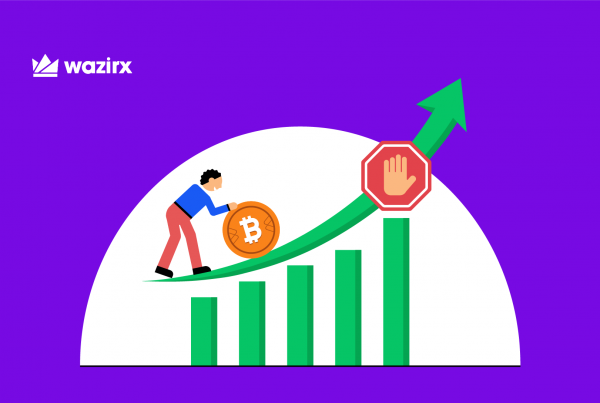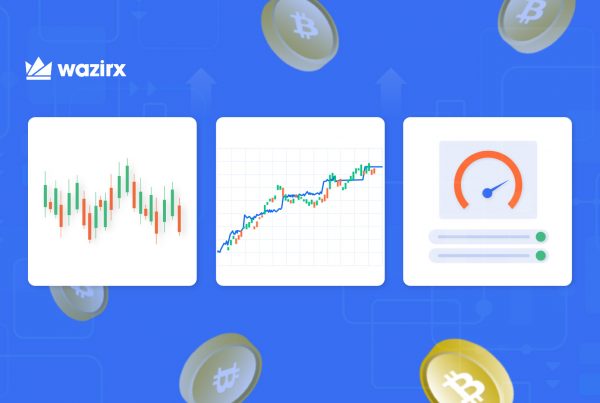Table of Contents
Note: This post has been written by Amal Augustine as a part of the “WazirX Blog Contest”.
Singapore is way ahead of other countries on their economic policies, financial regulations, and sustainable development. And that’s why it is the most preferred finance hub in Asia and has outranked Hong Kong in the last few years. If we closely observe why Hong Kong failed, it’s very clear that the economic policies from the alternating governments are not so favorable for business and are not welcoming the payment technologies such as Cryptocurrencies. But, on the other hand, the bureaucrats and policymakers in Singapore are most welcoming towards the latest technologies and are always ready to design balanced policies.
Singapore, one of the most stable economies globally, has a decent regulatory framework that other countries can override or overload. Moreover, the Singapore government does not see a difference between fin-tech and banks; they exist mutually and work together, unlike Indian banks that are scared of fin-tech or payments banks replacing them.
The Securities and Futures Act (SFA) is a legal document that outlines how the Singapore government intends to regulate the activities of the securities and derivatives industry. The Monetary Authority of Singapore is a central bank and financial regulatory authority of Singapore. The MAS is in charge of administering various statutes that oversee money banking insurance, securities currency issues, and the financial sector in general.
“We see the benefit through the lens of innovation, and outright banning cryptocurrency doesn’t help to understand the risk and what it comes to, what comes with the crypto. So allowing crypto to be an experimental construct in Singapore is what we are looking at.”
– Sopnendu Mohanty, Chief Fintech Officer, Monetary Authority of Singapore
Of course, every country should be worried about money laundering, financing terrorism, and Singapore’s robust policies to guard against money laundering and terrorism financing. And more importantly, they have a very thoughtful, expanded Payment Service Act, which today governs the crypto exchanges and other places dealing with payment tokens.
So they have regulations in place. They have safeguards in place. They have advisories in place. They constantly advise people about the risk of cryptos.
For the past five years, the MAS has been experimenting with blockchain technology within the framework of Project Ubin. So Project Ubin reached phase five this year in the summer, and it developed a multi-currency payment network in collaboration with JP Morgan and Temasek. This platform gives you the ability to transact with each other on the network digitally and directly in different currencies, which previously you could do only in Singapore dollars. This brings a wide range of benefits, especially when you have to make payments in multiple currencies. This can be much cheaper, faster around the clock. In addition, a more liquid FX market could result in better FX rate discovery, and the settlement of foreign currency-denominated securities becomes far simpler.
Some use cases are – conditional payments and escrow, finance networks, payment, and integration with healthcare claims. This is a perfect example where you need to have a blockchain-based network based on a smart contract to trigger a healthcare claim. And it could be multi-currency.
Cryptocurrencies are electronic assets that are held on an open-source, peer-to-peer network. They may have value, but they have no innate value. The value they have is essentially what the marketplace ascribes to cryptocurrencies also do not necessarily have predefined rights and obligations. Some may have rights and responsibilities, some do not, and even provide for rights and functionalities.
Singapore common law recognizes the concept of different types of property. One classification is between physical and tangible property things which can therefore be possessed and which can consequently be stolen. On the other hand, there will be what we call intangible property, which is we should not take a material form and thus technically cannot be possessed nor can it be stolen because cryptocurrencies are not tangible. Consequently, one would think that it could be considered intangible property. However, the common law also recognizes a third category, which we call documentary intangibles. Documentary intangibles are intangible assets, but they are encapsulated in a documentary form, and because they are encapsulated in a documentary form, they can actually be possessed, and therefore, they can be stolen.
The crypto history of Singapore really starts in 2017. In the early days of 2017, when ICOs or initial coin offerings began to gain prominence in Singapore as well as all over the world. By mid-2017, the popularity of Singapore as an ICO-originating country has started to peak to the point that a couple of months later, in August 2017, the MAS began to issue a warning concerning ICOs. This finally emerged in parliament and was prompted by the chairman of the MAS. Then deputy prime minister Tharman Shanmugaratnam had to make a statement in parliament considering ICOs, and in parliament, the deputy prime minister said that MAS was monitoring the situation very, very closely and would take action if necessary in November. So the MAS finally took some action in the form of issuing guidance on digital token offerings.
In this guidance, the MAS emphasized that certain digital token offerings could actually be regulated because these two tokens would have features that make them secure and brought them within the framework of Singapore security laws. The same month, the MAS also issued a consultation paper relating to new proposed legislation for payment services. And in that proposal, it was indicated for the first time that entities that deal in virtual currencies would also be subject to regulation under the new legislation. This new legislation became the Payment Services Act.
It was eventually enacted by parliament in January 2019. As mentioned, it provides the regulation of intermediaries that offer digital payment token services. The terminology changed a little bit between 2017 and 2019, and eventually, in January 2020, less than just about a year ago, the payment services act finally came into legal effect.
Few of the critical press releases were issued in light of all the frenzy over ICOs. The first significant press release was dated August 2017. In this press release, the MAS clarified that the offer of certain types of digital tokens would be subject to regulation if the tokens constituted products that came within the SFA.
About a year later, things have now evolved to the stage where the digital token exchanges were now quite popular. These are platforms typically online. They allow the trading of different types of digital tokens. Sometimes you can trade one token for another token, and even you can actually convert from cash to token and vice versa.
In this case, the MAS warned the eight digital tokens operating in Singapore, and the MAS said they shouldn’t allow trading in these tokens if these tokens constituted securities or futures because these would be regulated products.
In addition, in May 2021, the MAS also issued a warning to tell a proposed ICO issuer to stop offering fictitious tokens again because MAS considered this particular token to be a security.
The frenzy continued into 2019, and in this particular case, the MAS again warned an ICO issuer not to proceed until it could comply with its obligations under the SFA again the MAS took the opportunity to remind consumers at large to understand the benefits and risk of such products before committing to an investment.
How are cryptocurrencies treated under the current regulatory framework?
As mentioned earlier, two broad regulatory frameworks could potentially apply. First of all, the capital markets regulatory framework is established by two related legislation, the Securities and Futures Act and the Financial Advisor’s Act. So here, if the token has features that make it either a capital markets product or an investment product, then licensing under either the SFA or the FAA is potentially required.
Then assuming that the token is not a security or a capital markets product, the other question would be whether it consists of a digital payment token. Because under the payment services act, a person who deals in digital payment tokens will be required to be licensed under part 2 of that Act.
Now the terminology used in the SFA and FAA are consistent, and basically, the two important terms to note are Capital Markets Product and Investment Products.
Capital markets products are:
- Securities. (shares and bonds)
- Units in collective investment schemes. (Units in your mutual funds)
- Derivative contracts
- Spot fx contracts for the purpose of leveraged FX trading.
Investment products are slightly wider, so the term investment products include all of the aforesaid capital markets products and unleveraged spot FX contracts are also considered investment products, and life insurance policies are also considered to be investment products.
Entities that deal in either of these must be licensed or at least operate under an exemption under these two legislation.
So as far as determining whether the capital markets regulatory framework applies or not, the immediate question is to look at the crypto asset and ask yourself if it has features that make it the product within the scope of the SFA or the FAA. If not, well and good. If yes, then you need to consider two potential groups of rules. Firstly the SFA licensing laws under part four or the FAA licensing rules could apply to the intermediary dealing with the crypto asset. Furthermore, if there will be a public offering, then the SFA part 13 prospectus rules may have to apply.
Regulations under Singapore’s Payment Services Act
Payment Services Act provides licensing of payment services providers. So the basic rule is that a person must not carry on a business of giving any payment service unless he has a license.
In this regard, Payment Services include Digital Payment Token services. There are seven categories of payment services licensable under part two of the PSA. Of course, the one that we are concerned about is DPT services.
What’s a digital payment token?
- It has to be a digital representation of value.
- It has to be expressed as a unit. So there must be a certain number. It must be quantifiable, so there must be one token, two tokens, etc.
- It cannot be denominated not packed into any particular currency.
- Currently, DPT services only mean
- The service of dealing in DPTs. (Buying and selling DPTs )
However, there are new inclusions and amendments to the above services.
Assuming that you do need licensing, the PSA operates on a tiered system the first tier is only for money changing, but the second and third tiers are potentially relevant for entities that want to deal in cryptocurrency. So the second tier is basically what we call an SPI license, a Standard Payment Institution license. Here the licensing is subject to the condition that the entity must operate within a certain business volume level. So this depends on how many services you provide.
So if you’re offering DPT alone, then the total transaction value is $3Million or less, and this is calculated on an average basis over one calendar year. However, if you are also offering two or more services, the threshold becomes $6 Million or less. And if you are dealing in e-money, you also have an additional restriction of an average daily float of $5 Million measured over a calendar year.
SPI entities are subject to a minimum base capital requirement of $100,000. If these restrictions are too problematic, then the solution is to go for an MPI license.
An MPI license doesn’t have any business restrictions in terms of transaction flows or thresholds. But you do have a much higher base capital of $250,000. In addition, you might need to put in a security deposit of at least $100,000. MPIs are subjected to more rigorous regulation. There are more rules.
Under the new framework, MAS will have powers to impose various user protection measures on a service provider engaged in DPT services.
Money Laundering prevention in the regulation
Actual money laundering rules for DPT services providers are set up in this notice called MAS notice. So the overarching requirement is, of course, that the entity must always conduct enterprise-wide risk management. You must look at the clients themselves, the types of transactions, etc.
To make sure that the risk of money laundering or terrorism financing is properly managed and appropriate controls if deals with this risk.
When it onboards clients, of course, it must undertake customer due diligence. So customer due diligence consists of identifying customers, checking their identities, etc. Identifying beneficial owners persons who may control the customer and understanding the purpose of the relationship like what’s the purpose of the account being open for investments for speculation etc.
This information enables the entity, the service provider, to build up a client profile so that it can then detect what would be unusual or abnormal behavior. And if this unusual or abnormal behaviour is cause for concern, then the obligation under money laundering law is to report these as suspicious transactions to the authorities.
I hope this blog post helped you in understanding Singapore’s Cryptocurrency regulation framework in depth. Every country should consider implementing such frameworks and healthily safeguard cryptocurrency investments.
You can also refer to the official document of the acts mentioned above here – https://www.mas.gov.sg/news
Author: Amal Augustine

Amal Augustine is the founder of TechBuy. He started his blogging journey five years ago and is curious about Crypto, blockchain, personal finance, and digital investments. Apart from his interest in technology, he enjoys quizzing, reading, solo trips, blogging, and cooking.
Disclaimer: Cryptocurrency is not a legal tender and is currently unregulated. Kindly ensure that you undertake sufficient risk assessment when trading cryptocurrencies as they are often subject to high price volatility. The information provided in this section doesn't represent any investment advice or WazirX's official position. WazirX reserves the right in its sole discretion to amend or change this blog post at any time and for any reasons without prior notice.

















Thank you for the detailed information, great content
Thank you so much for publishing my content.